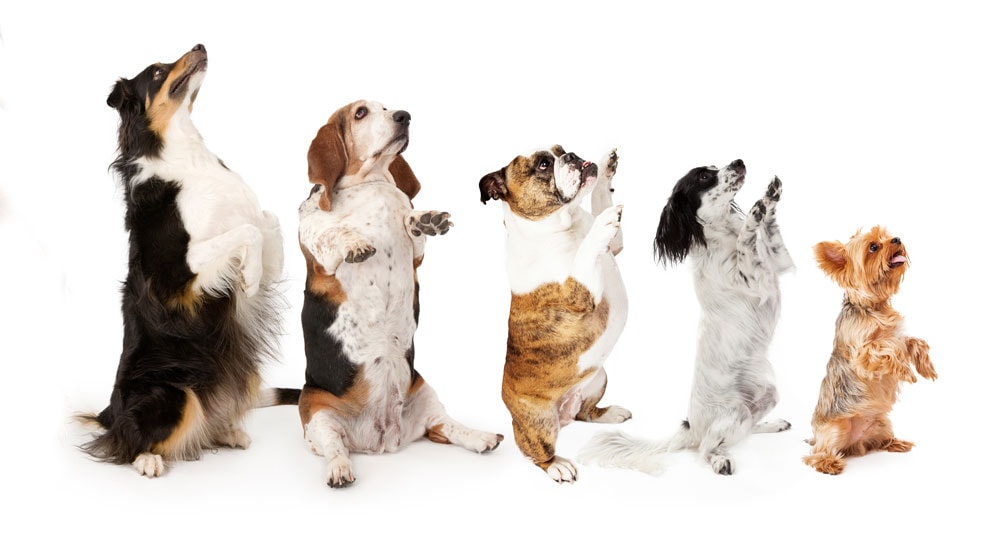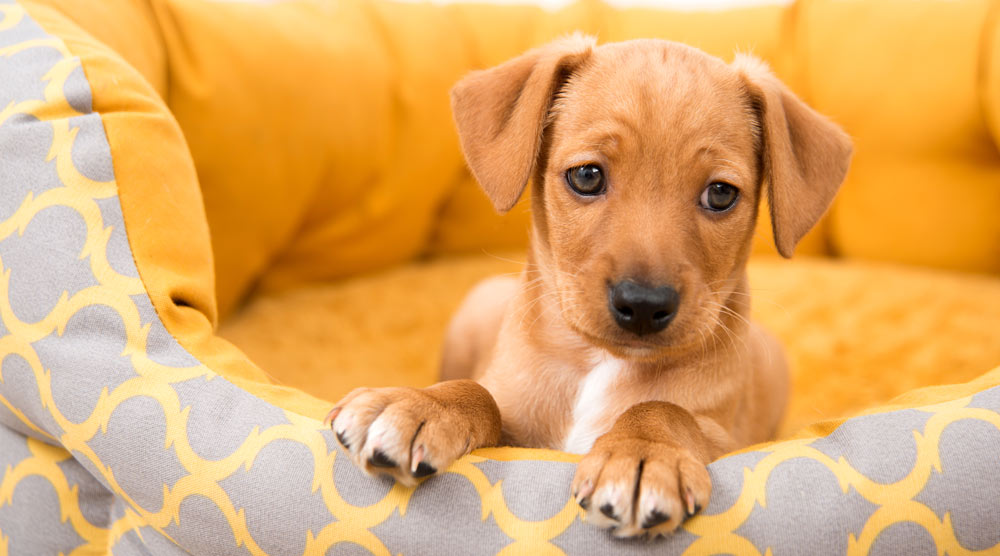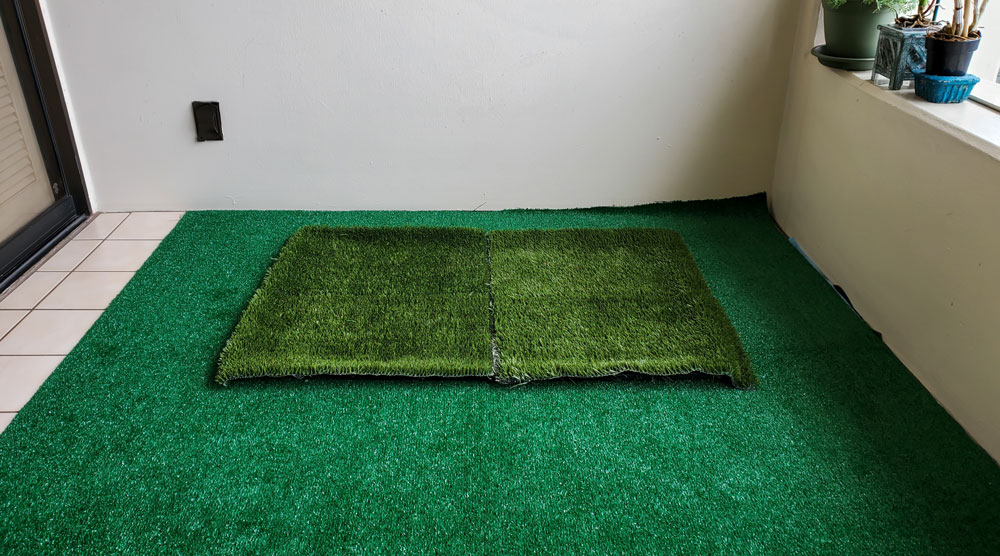Does your puppy’s potty training seem to have gone backwards? You’re not alone!
Regression is a common issue that affects many puppies. It’s a frustrating phase in your dog’s training, but it doesn’t always mean you’re doing something wrong. It also doesn’t mean your dog is trying to spite you or be “dominant”!
For example, it’s normal for puppies to forget parts of training as the brain develops. They might also have more accidents if their routine or environment changes.
Additionally, potty training regression can be due to a medical condition or stress, so a vet checkup is important.
In this article, I’ll go through some of the most common causes of potty training setbacks. I’ll also give you six tips for overcoming regression.
Contents
What Does Regression Actually Mean?
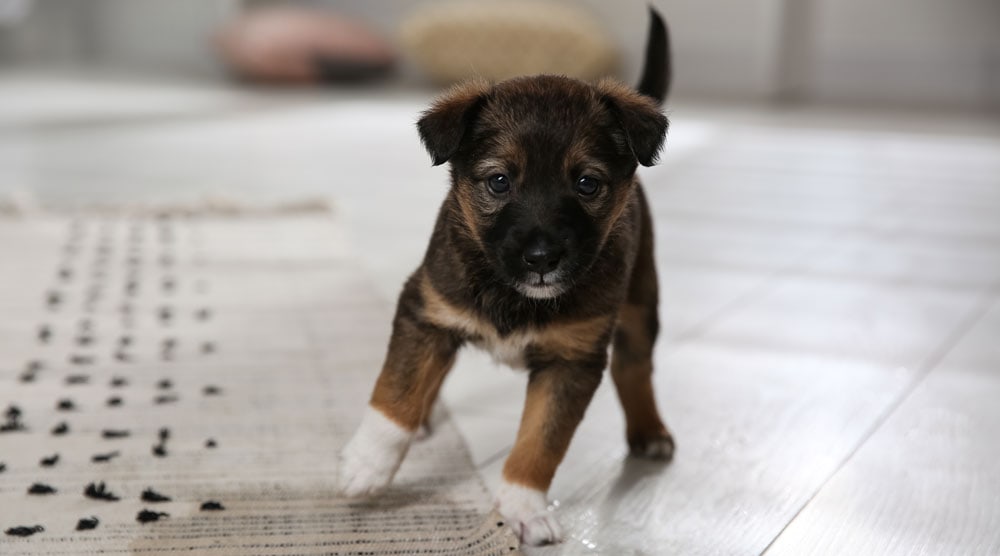
Potty training regression is when a puppy’s indoor accidents increase over time. This can be disheartening, especially if you’ve put a lot of time and effort into your dog’s housetraining.
Keep in mind that a one-off accident isn’t a sign of regression. Your puppy could be unwell or may have gone too long without being let outside. Accidents happen to all dogs occasionally – even those that are fully house-trained.
On the other hand, regular accidents could be a sign of regression. These accidents don’t always mean you’re doing something wrong though, so don’t panic! We’ll get to some tips for overcoming setbacks later in the article.
It’s also important to understand that your puppy is not being “naughty” or trying to upset you. Dogs aren’t capable of acting in spite. Even the “guilty” look your dog gives you is actually a response to your anger or frustration, not the accident itself.
What Can Cause Puppy Potty Training Regression?
Medical Issues
More frequent toilet accidents are often caused by a medical problem, not an actual regression in a puppy’s training.
For this reason, I always recommend getting a vet checkup if your puppy (or adult dog) has gone backwards with their potty training. It’s important to rule out medical issues before you take other steps to solve the problem.
Here are some examples of medical issues that could cause toilet accidents:
- Urinary Tract Infections (UTIs). UTIs cause a dog to urinate more, which can make it more likely for your puppy to toilet indoors. Other symptoms include crying out when urinating or blood in the urine.
- Diabetes. Diabetes can affect dogs of any age, including puppies. A common symptom is excessive drinking, which causes the dog to urinate more frequently.
- Cystitis. Cystitis is inflammation of the bladder, which is often caused by a bacterial infection. A puppy with cystitis may urinate more, but often only a small amount of urine is produced.
- Inflammatory Bowel Disease (IBD). IBD is a syndrome caused by irritation in the intestines. Dogs with IBD often suffer from diarrhea, which can increase the chance of indoor accidents.
- Parasites. Internal parasites, such as roundworm, tapeworm, and hookworm, can cause diarrhea. This can seem like potty training is regressing, when the puppy is actually struggling to hold on until she can go outside.
Brain Development
A puppy’s juvenile brain is rapidly developing. The puppy is also constantly taking on new information and experiences, which can be overwhelming.
For these reasons, it’s not surprising that puppies often forget parts of their training. In fact, this is a completely normal part of the development process.
The good news is that it’s much quicker to retrain your puppy than the initial training. As long as you remain consistent with potty training and avoid punishing your dog for mistakes, they often won’t take long to get back on track.
Moving Forward Before The Puppy Is Ready
It’s tempting to rush housetraining during those tiring first months of puppy parenthood!
However, the goal is to minimise the chance of your dog toileting in the wrong place. This means taking them out as often as necessary (as much as every hour when they are young.)
As your puppy’s bladder control improves, the gaps between toilet breaks can be increased. But if you increase them too quickly or by too much, then your dog might not be able to hold on.
This can cause your puppy’s training to regress, as they are now “practising” toileting indoors. Instead, take your puppy outdoors more than necessary, so they get plenty of chances to succeed.
Punishment For Accidents
Accidents can be frustrating – especially if your dog seems to have regressed with their training. But you should never punish your puppy for toileting indoors.
Punishment or scolding doesn’t show a puppy where to toilet. Instead, it teaches them that their owner is scary and unpredictable.
This increases anxiety, which causes the bladder to contract and makes indoor accidents even more likely. It also harms your bond and makes it harder for your puppy to trust you.
Another consequence of punishment is that it may teach the puppy to go to the toilet out of sight (such as behind a sofa). In this case, the puppy has learned that toileting in front of humans gets a negative reaction, but not that they should only go outdoors.
Change In Environment
Stress and anxiety can cause potty training regression. If there’s been a recent change in your puppy’s environment, then this might be the cause of more frequent accidents.
Some examples of changes that can cause stress include:
- Moving house
- A new baby
- A new pet
- A new partner
Puppies also often regress in potty training if they stay with a boarder. Aside from the change in environment, the dog boarder may not follow the same training schedule.
Change In Routine
Most dogs are happiest when they have a set routine. If you change your dog’s routine during housetraining, they may regress, as their eating and toileting times are now different.
Regression can also happen if the puppy’s bonded people aren’t in the house, even for a short time. This causes anxiety, which increases the chance of accidents.
Moving From Potty Pads To Outdoor Toileting
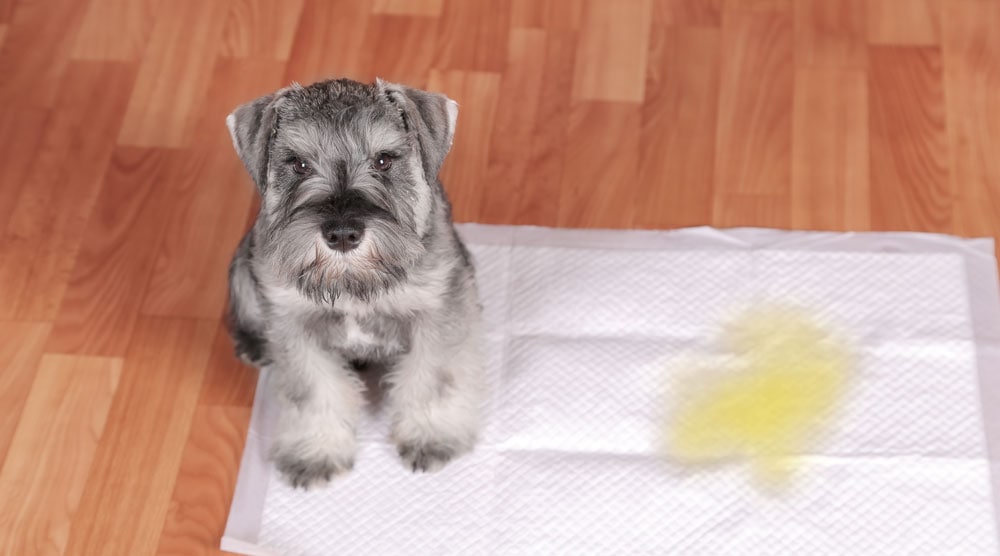
Many people use potty pads as an intermediate step when housetraining. While pads can be a useful tool, they are still teaching the dog to toilet indoors.
For this reason, it can appear that a puppy regresses when moving exclusively to outdoor toileting. This isn’t really regression though – the dog just hasn’t learned the new habit yet.
Separation Anxiety
Separation anxiety is a behavioural condition that causes a dog to feel intense panic and distress when left alone.
Toilet accidents are one of the most common signs of separation anxiety. These can make it seem like the puppy is regressing in their training, but are actually a sign of stress. Other symptoms include escape attempts, destructive behaviour, excessive barking, chewing, or pacing.
Separation anxiety is a serious condition that needs professional help. You should contact a qualified dog behaviourist if your dog is distressed when alone, as they’ll be able to help you with a training program for your puppy.
At What Age Is Puppy Regression Most Common?
A dog is most likely to regress with potty training during their first year of life. This is a period of rapid development and growth, which can make accidents or regression more likely.
Potty training regression can happen at any time in a dog’s life though. For example, many older dogs with canine dementia start to have indoor toilet accidents.
How To Handle Potty Training Regression
If your dog has regressed with potty training, the first step is to get a vet checkup. Once you’ve ruled out medical causes, here are some tips for handling regression.
1. Take A Few Steps Back In The Training Process
When your dog’s housetraining has regressed, you’ll need to take a few steps back in the training process.
This is because it’s essential to reduce accidents as much as possible. The more accidents your dog has indoors, the harder it’ll be for them to understand that they should toilet outdoors.
For example, you might need to increase the number of potty breaks during the day. You may also need to supervise your dog more closely or keep them in a smaller area when you’re not around.
Don’t get discouraged by moving backwards with the training. It’s only temporary and will get your dog’s training back on track much faster!
2. Never Scold Or Yell At Your Pet
As frustrating as potty training regression can be, it’s important to remember that your dog is not doing it on purpose.
They might be anxious, stressed, unable to hold on, or have just forgotten their previous training. Whatever the reason, the puppy is not trying to spite you.
You should never punish a dog for accidents. This can cause more stress and anxiety, leading to more frequent accidents.
Instead, reward your puppy when they go to the toilet in the right place. Treats are usually the best option, but a toy or praise can also work.
Note: Never use negative training methods, such as pushing a dog’s face into the mess. This doesn’t teach the dog what they did wrong. It only causes the puppy to become more anxious and stressed. It will also damage your bond.
3. Continue With A Consistent Routine
Consistency is essential when you’re trying to potty train a dog. You might need to adjust your dog’s routine and timings if they have regressed, but it’s vital to still stick to a consistent schedule.
Here are some tips for speeding up the potty training process:
- Give your puppy regular chances to go to the toilet. Your routine should include taking them out first thing in the morning, last thing before bed, after meals, after naps, and after play sessions.
- Take your puppy to the same spot outdoors whenever you want them to go to the toilet.
- Don’t play with your dog when taking them outdoors until they’ve gone to the toilet.
- Always reward your puppy for toileting in the right place with a treat or praise.
- If your dog is having more accidents than before, decrease the time between potty breaks. It’s important to avoid reinforcing the wrong behaviour.
- Take your dog to their toileting spot more often than you think is necessary. The more chances your dog has to be successful, the faster you’ll get through the regression stage.
4. Keep The Puppy In A Smaller Area When You Can’t Supervise
Regular potty breaks and supervision are essential for potty training. But you can’t watch your dog all the time.
One option is to keep your puppy in a smaller space whenever you can’t watch them. This is because dogs naturally try to avoid soiling their resting space.
A small playpen or crate can be a good option for this, as long as the puppy isn’t left alone for too long.
If your puppy has never been inside one before, take the time to build positive associations. Leave the door open and put treats and toys inside, then let them explore in their own time. You shouldn’t confine a puppy in a crate or pen until they are entering voluntarily.
5. Clean Up Indoor Messes
The scent of a previous accident can make it more likely for your puppy to go to the toilet in the same spot. To prevent this, it’s important to thoroughly clean any messes.
Remember, dogs have an incredible sense of smell. Just because you can’t see or smell a mess doesn’t mean it’s been properly cleaned!
Enzymatic stain and odour removers are often the best option. These break down old urine and eliminate odours much more effectively. Water probably won’t be enough, as the uric acid in urine isn’t water-soluble and will leave behind ammonia when the water evaporates.
Related Article: How To Get Rid of Dog Smells
6. Have Realistic Expectations
Housetraining can be a longer process than new owners realise. While many puppies can be housetrained in around 4-6 months, some dogs can take up to a year to be fully potty trained.
It’s also often not a linear path. There will almost always be setbacks, bumps in the road, and frustration before your dog is fully housetrained.
So, make sure you have realistic expectations when housetraining your puppy. Don’t think of regression as a failure, but just another obstacle to overcome with consistency and positive training.
Tip: Smaller breeds often take longer to housetrain. They have small bladders, which means they need to go outside more frequently.
Regression In Specific Situations
Potty Training Regression After Boarding
It’s common for a puppy’s housetraining to regress after spending time with a boarder. The change in environment and caregiver is stressful for many puppies, which can cause more toilet accidents. The dog boarder may also not have followed the same routine and training approach, which can cause confusion.
Potty Training Regression After Neutering
Neutering is another common cause of house training regression. This is often because neutering affects a dog’s hormones, which can make accidents more likely. The pain and stress of an operation can also have this effect.
Summary
Puppy potty training regression can be frustrating, but it’s not something a dog does on purpose. Instead, regression is often caused by medical issues, stress, or a training routine that’s progressed too quickly.
The key to overcoming regression is to remain consistent and give your puppy plenty of chances to succeed. Frequent bathroom breaks and a consistent daily routine are essential for minimising accidents. Whenever they go to the toilet in the right place, give them praise and a treat.
Never punish a dog for accidents, as this won’t teach them the desired behaviour. It can also cause stress and damage your bond.
Do you have any questions about puppy potty training regression? Please let us know in the comments below. You may also want to read our new puppy guide.

